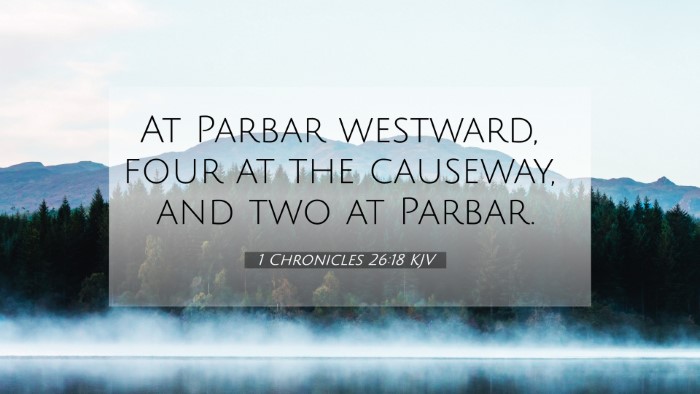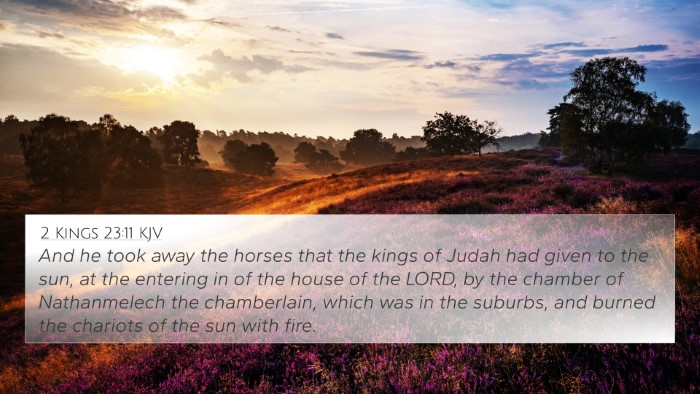Understanding 1 Chronicles 26:18
1 Chronicles 26:18 states: “At Parbar westward, four at the causeway, and two at Parbar.” This verse provides insight into the organization of the gatekeepers or porters in the Temple service. Here, we shall explore the meaning of this verse through various public domain commentaries and highlight connections to other Bible verses.
Summary of Insights from Commentaries
-
Matthew Henry's Commentary:
Henry emphasizes the importance of order in the temple service. The specifics of the gatekeepers' locations illustrate the precision and care that God’s people should take in worship. Each position was essential for the protection and organization of worship. The mention of Parbar and the causeway suggests a significance beyond mere geography; it points towards the spiritual foundation of worship.
-
Albert Barnes' Notes:
Barnes points out that this verse continues the theme of organization within the Levitical priesthood. The designation of numbers and locations suggests a well-structured approach to the duties of the Levites. It serves as a reminder that all roles within the worship service are divinely ordained and crucial for the worship experience.
-
Adam Clarke's Commentary:
Clarke notes that the assignment at Parbar reflects the historical context of the Levitical service. He expounds upon the relevance of these positions for maintaining order during worship. The structure demonstrates God's desire for His house to operate in harmony and excellence, a precedent that can be applied to contemporary church organization.
Bible Verse Cross-References
To better understand 1 Chronicles 26:18, we can identify several cross-references that illuminate its themes of order, service, and divine appointment in worship:
- 1 Chronicles 9:22: “All these, which were chosen to be porters in the gates, were two hundred and twelve.” This verse connects as it further elaborates on the roles of gatekeepers.
- 2 Chronicles 23:4: “This is the thing that ye shall do; A third part of you that enter in on the sabbath shall be of the priests and of the Levites.” This verse discusses the organization necessary for proper worship.
- Nehemiah 11:19: “The porters, Akub, Talmon, and their brethren, that kept the gates, were a hundred seventy-two.” It reinforces the importance of maintaining order at specific locations such as gates.
- Psalm 84:10: “For a day in thy courts is better than a thousand.” This verse reflects the value of being in the presence of God, underscoring the significance of the gatekeepers’ role in facilitating that access.
- Exodus 38:30: “And the silver of them that were numbered of the congregation was a hundred talents.” This highlights the contributions necessary for the service of God’s house.
- 1 Samuel 3:15: “And Samuel lay until the morning, and opened the doors of the house of the Lord.” Here, we see another significant role of enabling access to worship.
- Matthew 5:23-24: “Therefore if thou bring thy gift to the altar, and there rememberest that thy brother hath ought against thee...” This New Testament principle reflects the importance of reconciliation before worship, paralleling the organizational mandate in the Old Testament.
Thematic Connections and Insights
The verse in question, along with its cross-references, can lead to profound insights regarding Divine order and worship practices. The following themes emerge:
- Divine Order: The precise detailing in the roles and responsibilities of the gatekeepers suggests that God values organization within His house. This principle extends beyond the Old Testament into the New Testament church.
- Service in Worship: The gatekeepers' role symbolizes the importance of service in worship. Each person, regardless of their task, has a vital part in the broader worship experience.
- Access to God: Gatekeepers provided physical access to the Temple, mirroring the spiritual access we have through Christ, our ultimate mediator.
Tools for Bible Cross-Referencing
In exploring connections between Bible verses, various tools can aid in deeper study and understanding:
- Bible Concordance: An organized index of words found in the Bible that assists in locating verses related by theme or subject.
- Cross-Reference Guides: These resources list verses that connect, enhancing understanding of the scriptural narrative.
- Bible Study Apps: Many modern Bible applications have built-in cross-reference capabilities to help students of the Word explore connections efficiently.
Conclusion
The exploration of 1 Chronicles 26:18 reinforces the significance of order, the role of service, and the divine calling present in every aspect of worship. Through examining these related verses, we see how individual responsibilities contribute to a larger narrative of reverence and honor in serving God. As we engage in cross-referencing Biblical texts, we gather deeper insights into God's design for worship, equipping ourselves to better understand and live out our faith.
Whether we seek thematic connections, examine specific roles within Scripture, or understand the organization of the faith community, each verse enriches our journey in scripture. Harnessing tools for Bible cross-referencing will ensure we align ourselves with the holistic message of God’s Word.



